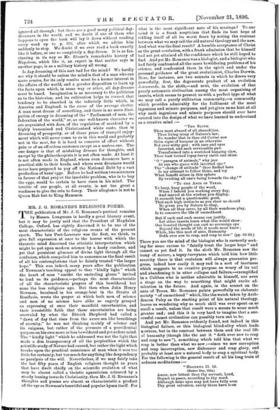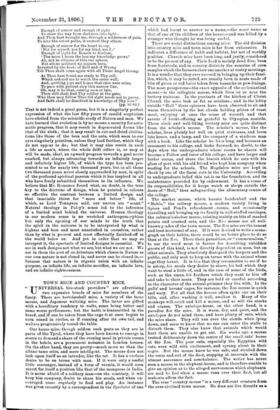MR. J. G. ROMANES'S RELIGIOUS POEMS.
THE publication of Mr. J. G. Romanes's poetical remains by Messrs. Longmans is hardly a great literary event, but it may be justly said that the President of Magdalen College, Oxford, has rightly discerned it to be one of the most characteristic of the religious events of the present epoch. The late Poet-Laureate was the first, we think, to give full expression at once to the horror with which the theoretic mind discerned the atheistic interpretation which might be put upon modern science by a hasty candour, and yet that persistent glimmer of divine light through all the confusion, which compelled him to announce as the final result of all his contemplations that he faintly trusted "the larger hope." This was, indeed, many years after the publication of Newman's touching appeal to that "kindly light" which the heart of man "amidst the encircling gloom" invited to lend us its guidance,—perhaps the most characteristic of all the characteristic prayers of this bewildered but none the less religious age. But then when John Henry Newman, becalmed in his orange-boat in the Straits of Bonifazio, wrote the prayer at which both men of science and men of no science have alike so eagerly grasped as expressing at once their manifold uncertainties, and their irresistible faith that these uncertainties are being overruled by what the Ettrick Shepherd had called a "dawn of day that rises from the azure sea like breathings of eternity," he was not thinking mainly of science and its enigmas, but rather of the pressure of a providential purpose on his own more or less bewildered and yet ardent mind. The " kindly light " which he addressed was not the light that made a dim transparency of all the perplexities which the scientific study of Nature had caused, but rather the light which breaks upon the practical conscience of man when it sees too little for certainty, but too much for anything like despondency or paralysis of the will. Nevertheless, if we may fairly take the last fifty years of English religious thought as years that have dwelt chiefly on the scientific evolution of what may be almost called a theistic agnosticism coloured by a steady leaning towards Christianity, then Mr. J. G. Romanes's thoughts and poems are almost as characteristic a product of the age as Newman's beautiful and popular hymn itself. For what is the most significant note of his musings ? To our mind it is a frank scepticism that finds its best hope of ridding itself of all its worst fears by noting the contrast between what we may call the old natural theology and the new. And what was the final result? A humble acceptance of Christ as the great revelation, with a frank admission that he himself had not yet attained all the confidence which he still hoped to find. And yet Mr. Romanes was a biologist, and a biologist who had fairly confronted all the more bewildering problems of his science, and confronted them in the spirit and under the personal guidance of the great evolutionist, Charles Darwin. Here, for instance, are two sonnets in which he draws very powerfully, first, the degenerate product of an evolution downwards, in the sloth,—and next, the evolution of that purely automatic civilisation among the most organising of insects, which seems to present us with a perfect type of what we may call a purely utilitarian community,—a community which provides admirably for the fulfilment of the most ingenious and minute purposes, and yet gives us no hint at all why such ingenious and minute purposes should ever have entered into the design of what we have learned to understand as a creative mind :—
"THE SLOTH.
Thou most absurd of all absurdities, Thou living irony of Nature's law, No wonder that in thee old Cuvier saw Grim signs of humour in an otherwise Not over-witty god : with ears and eyes Inverted, and each serviceable paw Transformed into a wretched hanging claw, Thou haat turned topsy-turvy earth and skies.
0 " paragon of animals," why jeer At one who gazes with inverted eye ? The "change of attitude" thou findest here Is my attempt to follow thine, and try What benefit arises in this sphere
By twisting all one's being towards the sky."
"To THE ANTS OF TEXAS.
Ye busy, busy people of the wood, When I behold you working every day, And marvel at the wisdom you display, It seemeth but a questionable good, That such high instincts as you show us should Be given you by Nature to obey, When all they serve, by all their wondrous play, Is to conserve the life of emmethood.
But if such end such means can justify, Let other insects learn what this would show : Our boasted thought can cast no sovereign eye Beyond the needs of life it needs must know ; While, like this nest of ants, Humanity Doth ever sow to reap, and reap to sow." (pp. 62-63.) There you see the mind of the biologist who is earnestly seek- ing for some excuse to "faintly trust the larger hope " and cannot as yet find it. In the sloth Mr. Romance saw the irony of nature, a topsy-turvyness which told him how little
security there is that evolution will always guarantee pro- gress, indeed how easily it may end in a sort of inertness which suggests to us creative purpose as weary of its toil and abandoning it in utter collapse and failure,—exemplified in a Caliban who is neither admirable in himself, nor even a stage on the way to something that might excite ad- miration in the future. And again, in the sonnet on the ants of Texas, Mr. Romance paints powerfully an elaborate society " of emmethood " which, like the watch taken by Arch- deacon Paley as the starting point of his natural theology, leaves us wondering why so much skill was ever spent on so small a result, unless that result were a means to some much greater end ; and this it is very hard to imagine that a suc- cessful emmet civilisation can possibly turn out to be.
And yet Mr. Romanes evidently found, not indeed in this biological failure. or this biological blind-alley which leads nowhere, but in the contrast between them and the real life of humanity (though like the ant it " doth ever sow to reap and reap to sow "), something which told him that what we reap is better than what we sow ;—since we sow corruption and reap incorruption, sow dishonour and reap glory, and probably at least sow a natural body to reap a spiritual body. For the following is the general result of all his long train of arduous meditations :— "Hzeazws II. 10.
(Easter Day, 1891.)
Amen, now lotted thou thy servant, Lord, Depart in peace, according to thy word. Although mine eyes may not have fully seen Thy great salvation, surely there have been Enough of sorrow and enough of sight To show the way from darkness into light ; And Thou haat brought me, through a wilderness of pain, To love the sorest paths, if soonest they attain.
Enough of sorrow for the heart to cry, Not for myself, nor for my kind, am I;' Enough of sight for Reason to disclose, ' The more I learn the less my knowledge grows.' Ab, not as citizens of this our sphere, But aliens militant we sojourn here, Invested by the hosts of Evil and of Wrong 'Till Thou shalt come again with all Thine Angel throng.
As Thou hast found me ready to Thy call, Which ordered me to watch the outer wall, And, quitting joys and hopes that once were mine, To pace with patient step this narrow line, .0h, may it be that, coming soon or late, Thou still shalt find Thy soldier at the gate, 'Who then may follow Thee till sight needs not to prove, And faith shall be dissolved in knowledge of Thy love."
(pp. 81-82.)
That is not indeed a great poem, but it is a singularly perfect expression of what the last fifty years of candid scepticism have elicited from the scientific study of Nature and man. We have learned that evolution is by no means a security for auto- matic progress, that it may result in degenerated forms like that of the sloth ; that it may result in cut-and-dried civilisa- tions like those of the bees and the ants, which seem to our eyes singularly pointless, unless they lead further, which they
do not appear to do; but that it may also result in such a life as man's, where the whole drift either is, or may at will be made, ideal, an upward progress towards a goal never reached, but always advancing towards an infinitely larger and infinitely higher life, of which the type has been pre- sented to us for nearly two thousand years, but in all those two thousand years never closely approached by man, in spite of the profound spiritual passion which it has inspired in all
who have freely submitted themselves to its influence. We believe that Mr. Rommel) found what, no doubt, is the true ikey to the doctrine of design, when he painted in colours so effective the contrast between a limited design and that insatiable thirst for " more and better " life, of which, as Lord Tennyson said, our nerves are " scant." Natural theology in Paley's sense led to the inference of a limited mind behind the universe. Human theology in our modern sense is no wretched anthropomorphism but only the opening of our minds to the truth that the spirit in the universe is to be interpreted by what is
highest and best and most unsatisfied in ourselves, rather than by what is poorest and most effectually finished-off in the world below us. And yet in order that we may so
interpret it, the spectacle of limited designs is essential. We see in such designs not what we are, but what we are not. We see in them the sort of araitecture which closes-in Nature as our own nature is not closed in, and never can be closed in,— because that nature is in organic union with an infinite purpose, an infinite life, an infinite sacrifice, an infinite love, and an infinite righteousness.























































 Previous page
Previous page